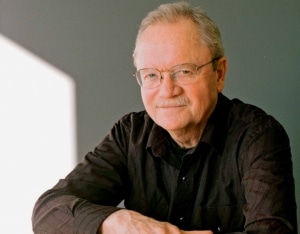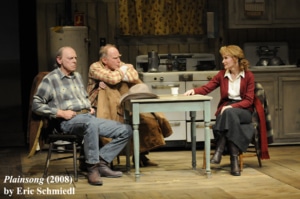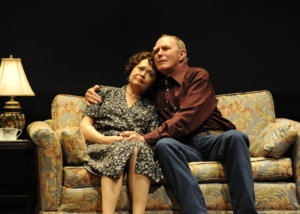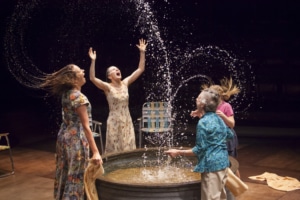DCPA NEWS CENTER
Enjoy the best stories and perspectives from the theatre world today.
Enjoy the best stories and perspectives from the theatre world today.
This article was published on November 30, 2014
Kent Haruf conjured an entire fictional town on the windswept Colorado Plains – with his eyes wide shut.
Haruf, perhaps Colorado’s most celebrated novelist, wrote Plainsong, Eventide and Benediction by tapping away at an old-fashioned manual typewriter in his backyard writing shed. And it was Haruf’s style to always type with his eyes closed. That was his way of allowing his imagination to help him create quiet, moving stories of the rural townspeople of Holt that millions of readers found to be universally identifiable.
Haruf, 71, died Sunday morning of lung disease at his home in Salida, about 150 miles southwest of Denver.

Kent Haruf
“Right now, I don’t feel like death is right around the corner,” Haruf said Monday in his final media interview with the DCPA. “But if it is, it’s a bigger corner than I thought it was.”
Over the past decade, the Denver Center for the Performing Arts has adapted Haruf’s entire Plainsong Trilogy for the live theatre. Benediction, the third chapter adapted by playwright Eric Schmiedl, will open on Jan. 30 at the Stage Theatre. And Haruf’s final novel, Our Souls at Night, is scheduled to be published on June 2.
There has been perhaps no other novelist so keenly in touch with Colorado’s roots.
“It’s hard to overestimate Kent Haruf’s influence on my life and on the Theatre Company,” said DCPA Producing Artistic Director Kent Thompson, who has directed all three of Haruf’s novels for the stage. “Kent always wrote with such authenticity, compassion, honesty and lyricism about life in small-town America — in his case, set on the Eastern Plains.
“Equally important, Kent wrote about a fundamental question of our time: Is your family your blood relatives or those who choose to care and love for you? And how do you build a family and a community?
Haruf’s terminal diagnosis came in February, at the same time a developmental version of Benediction was being introduced to Denver audiences as a staged reading at the DCPA’s Colorado New Play Summit. Haruf’s pulmonologist didn’t give Haruf an exact timeline for the progression of his disease.
“He told me, ‘You may just smolder on for a while,” Haruf said last week, “until you just … stop smoldering.’ “
After initially processing the diagnosis, Haruf said, “it was important to me to try to make good use of that time. So I went out to my writing shed every day — and I wrote.
“I don’t want to get too fancy about it, but it was like something else was working to help me get this done. Call it a muse or spiritual guidance; I don’t know. All I know is that the trust I had in being able to write every day was helpful.”
Haruf set out to write one short chapter every day, and by June, he had the first draft of Our Souls at Night completed.
“It’s the story of an old man and an old woman – something I know something about,” Haruf said. “I’m an old man myself now.”
Benediction, too, is about a dying old man, but one very unlike Haruf. The lead character of Dad Lewis is dying with powerful, profound regrets about his parenting that are as incurable as his disease.
“That idea of people dying with regrets that cannot be smoothed over … that’s a very interesting and powerful theme for me,” said Haruf, who died happily married to his wife, Cathy, and has been constantly surrounded, he said, in the love of his three daughters, three step-daughters and two step-sons. Very un-Dad Lewis-like.

(l-r) Philip Pleasants, Mike Hartman and Kathleen McCall in Plainsong. Adapted by Eric Schmiedl from the novel by Kent Haruf
Haruf said he could not be happier that DCPA actor Mike Hartman has starred in each of the three stage adaptations of his plays, including Benediction. Hartman said he recently caught himself “near tears five or six times” just while the reading Schmiedl’s latest Benediction script.
“Kent writes these characters who are so earth-bound,” Hartman said. “Their feet are just so well-planted. They are so dependable and so unyielding in principle and in the direction that they are heading.”
Hartman, who comes from a rural farming background himself, feels like he knows the people of Holt intimately, and their simplicity toward life.
“They are not by any means simple-minded, Hartman said, “but their lives are not as complex as we get sometimes in the city.”
Haruf was born Feb. 24, 1943, in Pueblo, the son of a Methodist minister, and graduated from Nebraska Weslyan University. He began writing fiction while in the Peace Corps in Turkey. He studied fiction writing in grad school at the Writers Workshop at the University of Iowa. He spent 30 years teaching English and writing.
Plainsong was a national bestseller in 1999 and won awards from the New Yorker and Los Angeles Times, and was a finalist for the National Book Award. Eventide (2004), Haruf’s second national bestseller, was named Notable Book of the Year by several newspapers, including The Denver Post. His other published novels include The Tie That Binds (1984), a finalist for the Pen/Hemingway Award; and Where You Once Belonged (1990), winner of the Maria Thomas Award in Fiction. Haruf’s short fiction has been included in the Best American Short Stories anthology.
As the end of his life approached, Haruf made a point to begin each writing day by reading one of three authors – Ernest Hemingway, William Faulkner or Anton Chekhov.
“Every morning I read something from one of those writers, just to remind myself of what a sentence can be,” Haruf said. “I just don’t have time to be reading something that is not of the highest quality.”
If you want to be a writer, Haruf advised, “I think you have to learn to read like a writer reads. That is, you are not reading for entertainment anymore. And you are not really even reading to see how a story plays out. What you are doing is reading to discover how somebody else has successfully done something on the page.”
Thompson says he finds it “Haruf-ian” that his mother-in-law, JoAnn McCall, was the one to first introduce him to Haruf’s writing.

Lauren Klein and Mike Hartman in Eventide. Adapted by Eric Schmiedl from the novel by Kent Haruf.
“She gave me a hardback copy of Plainsong,” said Thompson, who was born in Jackson, Miss. “She and my father-in-law, Don McCall, had grown up in the Eastern Plains of Colorado with the Haruf brothers, with childhoods and lives interwoven.
“When my wife, Kathleen McCall, and I first met with Kent and Cathy Haruf — note the first names — to discuss adapting Plainsong to the stage, it felt like a project brought about by a higher force — fate, faith or the alignment of the planets. Eric Schmiedl uncannily found the voice of Haruf’s characters and, together with so many actors, we earned the trust of Haruf.
“The plays that followed, Plainsong and Eventide, were deep dives into both Colorado and humanity. We will all miss Kent Haruf terribly. From his insight to his guiding hand in rehearsals, we will never forget this wise friend and brilliant novelist.”
Haruf just contributed an autobiographical essay called The Making of a Writer to the new issue of the literary magazine Granta. It begins in 1943 with his birth with a cleft lip, which was only partially corrected by surgery: “The surgeon was supposed to do more work on my lip and nose, but he died in a plane crash and my parents took that as a sign of God’s will, and so nothing more was done,” Haruf wrote in the essay.
Many decades later, the lip still was a source of great embarrassment to Haruf.
“But the truth is, I have come to think … that perhaps those years of unhappiness and isolation and living inwardly to myself have helped me to be more aware of others and to pay closer attention to what others around me are feeling,” he wrote.
Of that essay, Haruf told the DCPA last week, “I tell how I think I became a writer. I think it suggests some things that might live on past my own physical being.

(l-r) Nance Williamson, Zoe Delaney Stahlhut, Kathleen McCall and Billie McBride in Benediction. Adapted by Eric Schmiedl from the novel by Kent Haruf. Photo by Jennifer M. Koskinen
“I do want to be remembered as someone who was loving and compassionate toward other people. And the older I have gotten, and the closer to death I have gotten, people have grown more dear to me. So now I want to be completely present when I am with anybody. I can’t say that has always been true. It hasn’t been.
“As a writer, I want to be thought of as somebody who had a very small talent, but worked as best he could at using that talent. I want to think that I have written as close to the bone as I could. By that I mean that I was trying to get down to the fundamental, irreducible structure of life, and of our lives with one another.”
When Benediction opens on Jan. 30, Haruf said he hopes audiences leave the Plainsong Trilogy behind having seen a sweeping portrayal of life as it is.
“In one house, an old man is dying without solving all of his problems, or being able to end his regrets,” he said. “But in the very next house, there is this 8-year-old girl who is the representative of hope and promise and youth and joy. What I am wanting people to feel is that the beginning and the ending in all of our lives are set side by side. They are not distinct from one another.
“They are joined as neighbors.”
A STATEMENT FROM ERIC SCHMIEDL:
We lost a great artist yesterday. Thankfully, we have his writing to turn to for guidance. I immediately turn to a moment late in Plainsong. After having returned from Denver the young pregnant girl, Victoria Roubideaux, approaches the old bachelor ranchers Harold and Raymond McPheron to ask if they will take her back into their care. They do. And when asked if they’re ready to try this again Raymond reveals, “That girl made a difference out here for us and we missed her when she was gone. Anyhow, what was we suppose to do with that baby crib of hers?” This moment made me laugh and cry the first time I read it. It makes me do so now. It represents the rawboned unadorned honesty as well as the possibility for goodness found in Kent’s stories. And one of the fondest memories I have of our production of Plainsong at the Denver Center Theatre Company was listening to the sniffles rising from the audience as this scene played out before our eyes because it meant that we had successfully achieved our goal of translating this beauty to the stage. That production also represented a rare gift; a true collaboration between an author, a playwright, a director, and a wonderful theatrical company. Like Kent’s writing each participant played a critical role in creating the tapestry of efforts that made up each performance. It also fostered two more collaborations which have allowed our collective relationships grow deeper and the work to become richer. Without a doubt it has transformed my life. Now, as we prepare for our production of Kent’s most recent novel, Benediction, we will be missing a key component. So once again I turn to his writing. Benediction closes with a typically simple but powerful set of images. “That was on a night in August. Dad Lewis died early that morning and the young girl Alice from next door got lost in the evening and then found her way home in the dark by the streetlights of town and so returned to the people who loved her.” While heartbroken we have been given a special opportunity to do what we can as fellow artists – to celebrate our dear friend and mentor with our hearts and talents in order to touch other people as much as Kent Haruf has touched us.

Leave a Reply
Want to join the discussion?Feel free to contribute!